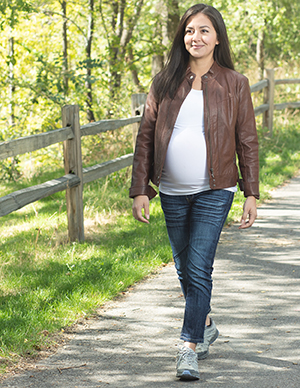While you’re pregnant, an exercise routine helps both your mind and your body feel good. It tones your muscles and makes them stronger. It also gives you and your baby more oxygen.
The right exercise for you
Overall conditioning is best for you and your baby. Try walking, swimming, or riding a stationary bike. Always warm up, cool down, and drink enough fluids. Keep a snack close by in case your blood sugar gets low. Discuss exercise choices with your healthcare provider. Talk about the following:
-
If you already exercise, find out how to adapt your routine while you’re pregnant. Keep the intensity of the exercise moderate. As your pregnancy progresses, your center of gravity will change. Be careful to keep your balance.
-
Ask if there are any local prenatal exercise classes, such as yoga or water aerobics. Find out which prenatal exercise videos are good choices.
-
If you were not exercising before your pregnancy, find out the best way to start. Now is not the time to begin a new workout on your own. Start slowly. Listen to your body.
-
Ask which forms of exercise you should avoid. These may include risky activities like hot yoga, horseback riding, scuba diving, skiing, skating, and contact sports.
Pelvic tilts
These help strengthen your stomach muscles and low back. You can do pelvic tilts instead of sit-ups.
-
Do this exercise on your hands and knees.
-
Relax the back of your neck. Pull your stomach in until your low back flattens.
-
Hold for
30 seconds. Release. Repeat10 times. Do this twice a day.
Pelvic floor exercises
Pelvic floor exercises strengthen the pelvic muscles. Doing pelvic floor exercises daily helps prepare these muscles for delivery. They also help ease your recovery. You can exercise these muscles by tightening, holding, then relaxing them. Try contracting your muscles as if you were stopping your urine stream (but do it when you’re not urinating). Hold for
Tips to add activity
Here are some tips to follow:
-
Park the car farther from a store and walk.
-
If you can, do errands on foot instead of driving.
-
Walk across the office to talk to someone in person instead of calling.
-
While waiting for appointments, go up and down stairs or around the block.
Tips to stay active
Here are some tips to follow:
-
Maintain your routine. But exercise less intensely if you feel tired.
-
Base your workout on how you feel, not your heart rate. Heart rates aren’t a good way to measure effort during pregnancy.
-
Don't exercise on your back after week 16.
What are the warning signs that I should stop exercising?
Stop exercising and call your healthcare provider if you have any of these symptoms:
-
Vaginal bleeding
-
Dizziness or feeling faint
-
Increased shortness of breath
-
Chest pain
-
Headache
-
Muscle weakness
-
Calf (back of the leg) pain or swelling
-
Uterine contractions or preterm labor
-
Decreased fetal movement
-
Fluid leaking (or gushing) from your vagina


